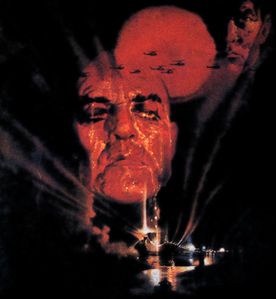| View the final image from Apocalypse Now |
Thus by 1979 Coppola has fallen not only out of time but out of context. He has nothing to say and no stage on which to say it. He will remain, after all is said and done, the guy who made the Godfather movies in the early '70s … frozen in the past … exiled from the present … a man who has fallen out of time.
Cioran calls this exile, this frozen-ness, an "inverted eternity" … a present that refuses to budge despite the soul’s exertions. It is rather like having an active mind caged in a frozen body, a metaphysical paraplegia. This is hell, a recurring monotony that leads no further than itself, a maze that always deposits you in the same listless present. Here, on this patch of frozen ground, un-self-conscious productivity is the Garden of Eden … the ongoing present, a sterile silence.
It was a fate of Coppola’s own making and yet it wasn’t, and within that contradiction lies the tragedy. Cioran, again: A man who seeks to be more than he is will not cease to be less. But that he ended up with so much less seems like a sadistic prank. He did, after all, attempt nothing less than a movie about Vietnam … about history and the evil need for domination. But in Coppola’s attempt to reflect the nothingness of history, history (cruel jokester) inverted the mirror to reflect the nothingness of Coppola.
Apocalypse Now is, in its way, the first postmodern movie about nothing … or rather, an exploration of the nothingness at the heart of itself. But it is different in that it still has a bit of content, before all of culture like History evaporates, and turns to recycled simulation … and America becomes a machine churning out spectacular fever-dreams that are empty at the core.
Movies … our national dreams … are forever different from now on, as a kind of recycled nothingness becomes the main subject of Hollywood. Until the time, roughly, of Apocalypse Now, movies could be simulated images of history, a simulation of a world that we could assume existed beyond the soundstage … until images began to dominate history, and history itself became that simulation. We can mark the Reagan era "A.C.": After Coppola, where simulation overtakes history, to the point where both have now conflated. (See, for example, the Gulf War.) We live in a culture of the Xerox without the original, signifier and signified having imploded in a single stream of recycling, a cannibalization of history … as Oliver Stone now "presents" the '60s and Steven Spielberg "presents" slave-liberation and the Holocaust. A recent book, The Making of Schindler’s List contains a photo insert wherein images from History – the real Schindler, the real Amon Goeth and Schindler Jews – blend seamlessly into Spielberg’s simulations of same. Apocalypse Now is one of the first of the virtual era to so flagrantly blur this distinction … our film was Vietnam … it was a grand voyage over the border, into that realm where historical reality, human reality (the very stuff of art and poetry), is forever obscured by electronic mediation. Reality is now virtual-reality’s identical twin. Both are two-dimensional, interchangeable: time, even, has been terminated with extreme prejudice and now seems to exist only in the virtual. Coppola broached that border with dazzling Hollywood flair – and, like the historical, evaporated.
(Cioran: Every form of sterility and impotence participates in hell…)
In this light, Coppola’s sin seems forgivable. His arrogance and cruelty still pluck when we read of it, but it did come back to haunt him. Apocalypse Now was a game he lost from the start, the deck so loaded against him. He played but he didn’t play because it was a rigged game, a virtual game with (demonically) real consequences. He lost his voice, his vision … in other words, everything, the worst possible punishment for the audacious spellbinder. (He certainly landed on the wrong side of the laugh.) Now, of course, he directs adaptations of John Grisham novels, his ambition all but emaciated.
How sad for all of us who love film, love stories, that we lost the great spellbinder and his whole stomping horde. We lack those outspoken rebels when we most need them … here in our current malaise, this ongoing "sterility of meaning" and aimlessness of narrative that has become so unbearable. Isn’t there a chance for regeneration? After all, even the blinded king returned to triumph on that small patch of soil … even those fickle gods gave him a second chance. Can’t we hope for the resurrection of at least one of the old guard, if only for one story, one film.… Mightn’t Rafelson or Friedkin or Coppola resurrect before the final curtain for one last shot at glory, a howl, a yelp that might wake us from this stultifying dreamless dream? Mightn’t they somehow stumble, by the Gods’ good graces, into their Colonus, their redemption?
Darren Haber is a writer living in Los Angeles. He writes screenplays, fiction, and essays. He is currently writing a film script about a Buddhist monk who comes to Hollywood.



